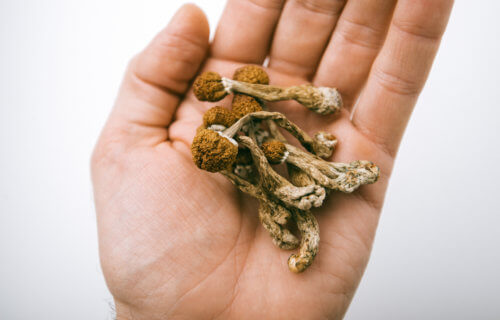
LONDON — Scientists finally know how magic mushrooms — a psychedelic drug — rewires the brain to treat depression. An international team says the psychedelic compound psilocybin is the key, helping to “open up” the minds of patients even weeks after using the drug.
Researchers from Imperial College London examined the brain scans of nearly 60 people in treatment for depression. The scans revealed that psilocybin therapy increased brain connectivity in these patients, lasting for up to three weeks. By “opening up” the brain, patients reported improvements in their depressive symptoms.
Conversely, using conventional antidepressants such as escitalopram did not increase brain connectivity, suggesting the psychedelic affects the mind in a much different way from standard prescription drugs. Previous studies have also looked at the possibility of using mushrooms as a mental health medication as well.
“The effect seen with psilocybin is consistent across two studies, related to people getting better, and was not seen with a conventional antidepressant,” says senior author Professor Robin Carhart-Harris from the University of California-San Francisco in a media release.
“In previous studies we had seen a similar effect in the brain when people were scanned whilst on a psychedelic, but here we’re seeing it weeks after treatment for depression, which suggests a ‘carry over’ of the acute drug action.”
How is psilocybin rewiring the brain?
Although scientists working with magic mushrooms have seen these benefits before, it hasn’t been clear how psilocybin actually alters the brain. Using fMRI scans on the patients in the randomized control trial, researchers found people taking the compound saw an increase in communication between brain regions that are usually isolated in depressed brains.
Additionally, researchers discovered a link between improving symptoms and more connectivity in the brain. Although the strength and duration of these benefits varied from person to person, the team found the strongest brain changes among patients reporting the greatest improvements in their mental health.
“We don’t yet know how long the changes in brain activity seen with psilocybin therapy last and we need to do more research to understand this. We do know that some people relapse, and it may be that after a while their brains revert to the rigid patterns of activity we see in depression,” says Prof. Carhart-Harris.
Mushrooms could make the brain more ‘flexible and fluid’
Scientists note that trials examining psilocybin’s impact on depression generally take place under controlled, clinical conditions and use regulated doses of magic mushrooms. The team adds that people dealing with depression should not try self-medicating with psilocybin or consume magic mushrooms without the guidance of a medical professional.
“These findings are important because for the first time we find that psilocybin works differently from conventional antidepressants – making the brain more flexible and fluid, and less entrenched in the negative thinking patterns associated with depression. This supports our initial predictions and confirms psilocybin could be a real alternative approach to depression treatments,” says Professor David Nutt, the head of the Imperial Centre for Psychedelic Research.
“One exciting implication of our findings is that we have discovered a fundamental mechanism via which psychedelic therapy works not just for depression – but other mental illnesses, such as anorexia or addiction. We now need to test if this is the case, and if it is, then we have found something important,” Prof. Carhart-Harris concludes.
The findings are published in the journal Nature Medicine.

